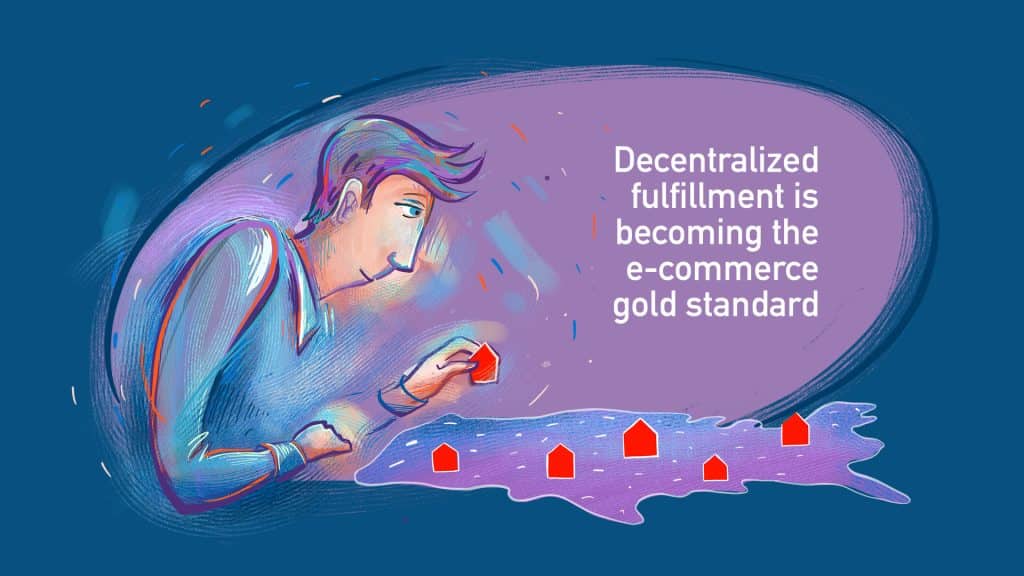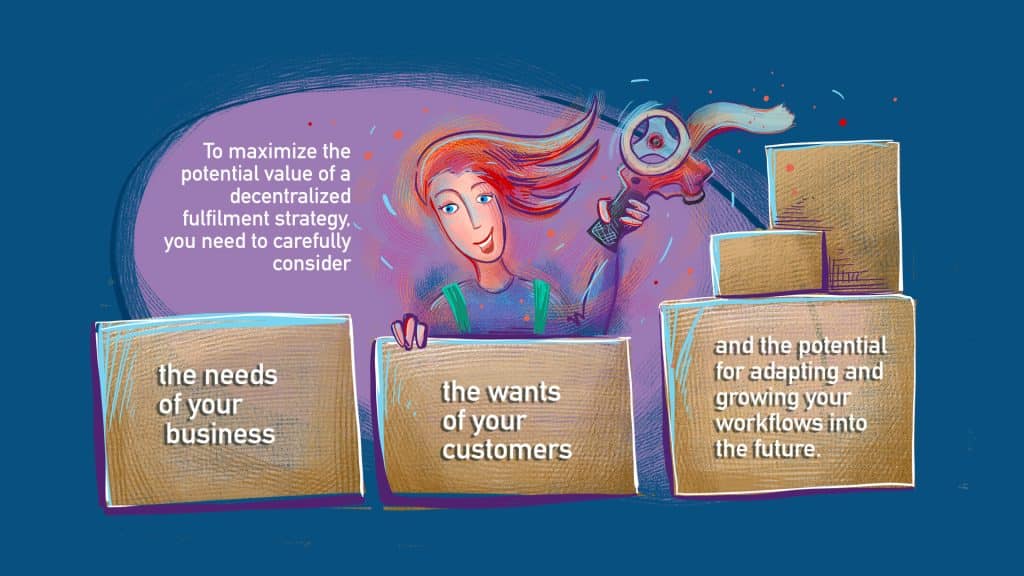
Key Points
- Decentralized fulfillment is a fulfillment strategy where ecommerce sellers distribute inventory and order fulfillment across multiple warehouses or locations to reduce shipping costs and improve delivery speed.
- Some of the most significant benefits of decentralized fulfillment include better shipping speeds, greater geographic reach, reduced Cost Of Goods Sold (COGS), and increased flexibility.
- Consider customer locations, bulk shipping options, storage costs, and third-party vendor risks when planning a decentralized fulfillment strategy.
- Descartes Sellercloud is an ecommerce solution that provides the features and tools to run a fully decentralized fulfillment workflow, regardless of business size.
Shipping speed and efficiency are critical components of competitive ecommerce retail. Just as many online sellers have rightly adopted omnichannel marketing strategies, diversifying fulfillment capabilities can also provide benefits.
The adage ‘don’t put all your eggs in one basket’ has never rung truer than it does today. Disruptions across the retail spectrum have forced both ecommerce businesses and online shoppers to adopt a level of flexibility unlike anything the industry had previously seen.
Supply chain disruptions, shipping carrier inconsistencies, increasing demand for warehouse space, frequent out-of-stocks, and dramatic price fluctuations have all led to noteworthy volatility. Even as some of these issues begin to ease, ecommerce brands need to take with them the lessons learned to be best prepared for future uncertainty.
Moving forward, flexibility must be baked into nearly every aspect of a successful and growth-focused ecommerce operation. Fulfillment is one of the pillars of online sales and, as such, deserves particular focus.
Decentralized fulfillment continues to grow as a feasible, reliable, and cost-effective way to add deliberate flexibility to your shipping workflows and your customer-facing shipping options.
What Does Decentralized Fulfillment Look Like for Ecommerce Sellers?
For many ecommerce startups, processing and shipping orders is a very centralized process. Orders are processed, and packages are sent out from a single location. Whether it’s a garage or a warehouse, centralized fulfillment is fairly simple to run and keep tabs on since almost the entire order is processed and handled under the same roof.
Branching into a more decentralized model means spreading your fulfillment capabilities across multiple locations. This could mean enrolling in a marketplace-based fulfillment program like Fulfillment By Amazon (FBA) or enlisting the help of a third-party logistics provider (3PL).
It could also be something more complex, like setting up a multi-warehouse operation of your own. In each case, fulfillment is decentralized by transferring some or all of your inventory from your headquarters to other locations. When orders come in, these warehousing and fulfillment locations complete the logistical work of moving merchandise to the awaiting customers.
The Benefits of Decentralized Fulfillment for Ecommerce Businesses
On the surface, expanding your fulfillment with new partnerships could seem like an expensive and complicated proposition. It’s not. In reality, the modern retail landscape has put decentralized fulfillment within reach for many ecommerce businesses of all sizes and types of products.
Making the move to decentralized or outsourced fulfillment can offer your brand a host of benefits, including increased competitiveness and profitability.
Faster Shipping Speeds and Shorter Delivery Times
In today’s ecommerce landscape, fast shipping matters to customers. By expanding your fulfillment beyond your home base, you can shorten the distance products have to travel to reach customers. This allows you to offer faster and more competitive shipping options than you might be able to otherwise.
Expanded Geographic Reach Without Higher Shipping Costs
Decentralizing your fulfillment can make it more feasible to market to customers outside your typical reach. When implemented well, decentralized fulfillment can lower domestic shipping costs and estimated package arrival dates, allowing you to potentially compete with domestic sellers on the opposite coast or even in international markets.
Lower Fulfillment Costs and Reduced Cost Of Goods Sold (COGS)
There was a time when decentralized fulfillment was simply too expensive a proposition to consider for many smaller ecommerce businesses. Nowadays, the prevalence of 3PL businesses and marketplace-based fulfillment options has lowered the barriers to entry for retailers of all sizes. Making the right choice can save your company significant money over your current centralized fulfillment costs.
Greater Fulfillment Flexibility and Risk Mitigation
By now, everyone has felt at least some degree of the negative impact world events can have on their ability to reliably fulfill ecommerce orders. When all your inventory is in one place and flows through the same fulfillment stream, an unanticipated disruption could halt your entire operation.
Decentralized fulfillment can protect against future volatility, giving your brand more flexibility in managing inventory and deciding how to circumvent disruptions. The effectiveness of your planning and implementation will determine whether you achieve any or all of the aforementioned benefits through a decentralized fulfillment model.

How to Plan a Decentralized Fulfillment Strategy
Decentralizing fulfillment is not, in and of itself, a cure-all for your inventory and shipping woes. If not properly organized and monitored, decentralization can cause more headaches than it cures for your ecommerce brand.
To maximize the potential value of a decentralized fulfillment strategy, you need to carefully consider your business’s needs, your customers’ wants, and the potential for adapting and growing your workflows in the future.
These considerations must include:
Choosing Fulfillment Locations Based on Customer Demand
Choosing the optimal fulfillment center locations should involve assessing where your customer bases currently exist. Shortening the distance between your products and their destinations will yield the most immediate and lasting benefits.
If your marketing and research support it, you might also consider selecting locations relative to new markets and customer bases you hope to reach with your omnichannel offerings.
Planning Bulk Inventory Transfers and Replenishment Shipping
When you decentralize your fulfillment, you shift from shipping individual customers’ orders to shipping bulk quantities of merchandise to your fulfillment centers, warehouses, and third-party partners.
You need to be prepared for the costs and logistics of making these less frequent but significantly larger shipments. In some cases, this may require changes to your shipping partners or new workflows for palletizing fulfillment replenishments.
Evaluating Warehouse and Storage Costs
When other fulfillment partners or warehouses store your inventory for you, that comes with a cost. Some partners offer steady rates based solely on volume, while others fluctuate based on additional factors such as weight, product, or season.
If you own secondary warehouse locations, you must ensure that you pay for real estate that is neither too small nor too large. Storage fees can make or break the success of your decentralized fulfillment efforts.
Ensuring Your Fulfillment Network Can Scale
Growth-focused ecommerce needs the logistical support and physical space to scale effectively. As such, your fulfillment workflows need to have the potential to support increasing order volumes.
Managing Third-Party Logistics and Vendor Risk
Partnering with outside vendors to support any aspect of your ecommerce brand always carries some risk. Thoroughly vet any service or company before hiring them to join your logistics team.
Why Decentralized Fulfillment Requires Centralized Inventory and Order Management
Implementing an effective decentralized fulfillment plan requires an ecommerce inventory management system that can keep your inventory locations working in concert and your merchandise flowing smoothly.
Whether through multiple warehouse locations run by your company, opting into marketplace-based fulfillment programs like FBA, enlisting the support of 3PL partners, or some combination thereof.
A piecemeal approach can cause confusion and miscommunications that can not only eliminate the value of decentralizing your fulfillment but can also cause significant harm to your overall efficiency and reputation. Instead, you need a system that allows for clear, immediate, and reliable communication across your entire company and its supporting services.
Descartes Sellercloud’s omnichannel growth platform includes the inventory management tools and software you need to run a fully decentralized fulfillment workflow, regardless of how large or small it may be. Our native integration with FBA makes it easy to see immediate benefits from outsourcing elements of your order fulfillment.
Likewise, our integrations with industry-leading shipping and logistics partners make it easy to bring new and dependable partners on board to help meet your brand’s needs.
When you are ready to expand into your multi-warehouse fulfillment model, Descartes Sellercloud modules like the Skustack WMS provide the scalable warehouse management support you need to empower your staff and satisfy your customers.
Contact us for a free demo and see how Descartes Sellercloud is the perfect partner for bringing your fulfillment strategies and workflows to the next level.
Decentralized Fulfillment FAQs
Is Decentralized Fulfillment Only for Large Ecommerce Businesses?
No. While enterprise retailers were early adopters, decentralized fulfillment is now accessible to small and mid-sized sellers through third-party logistics providers, marketplace fulfillment programs, and shared warehouse networks. Many businesses begin decentralizing with just one additional fulfillment location and expand over time.
How Does Decentralized Fulfillment Impact Inventory Accuracy?
Decentralized fulfillment increases the need for accurate, real-time inventory visibility. Without centralized inventory management, sellers risk overselling, stock imbalances, or fulfillment delays. Businesses that succeed with decentralized fulfillment typically rely on software that synchronizes inventory across all locations and sales channels.
What’s the Difference Between Decentralized Fulfillment and Distributed Order Management?
Decentralized fulfillment refers to where inventory is stored and orders are fulfilled, while distributed order management focuses on how orders are intelligently routed to the best fulfillment location based on cost, speed, or availability. Many ecommerce businesses use both together to optimize fulfillment performance.




